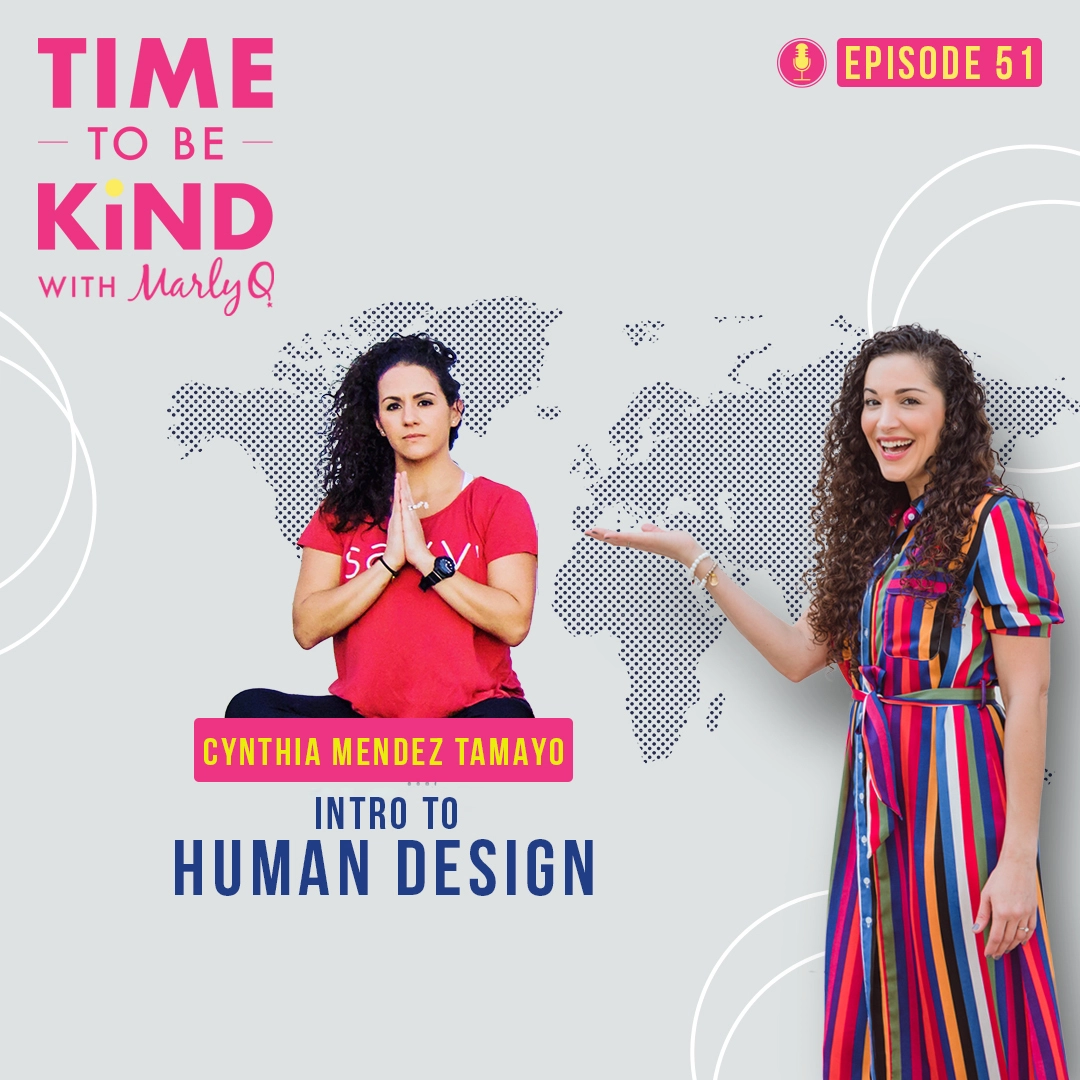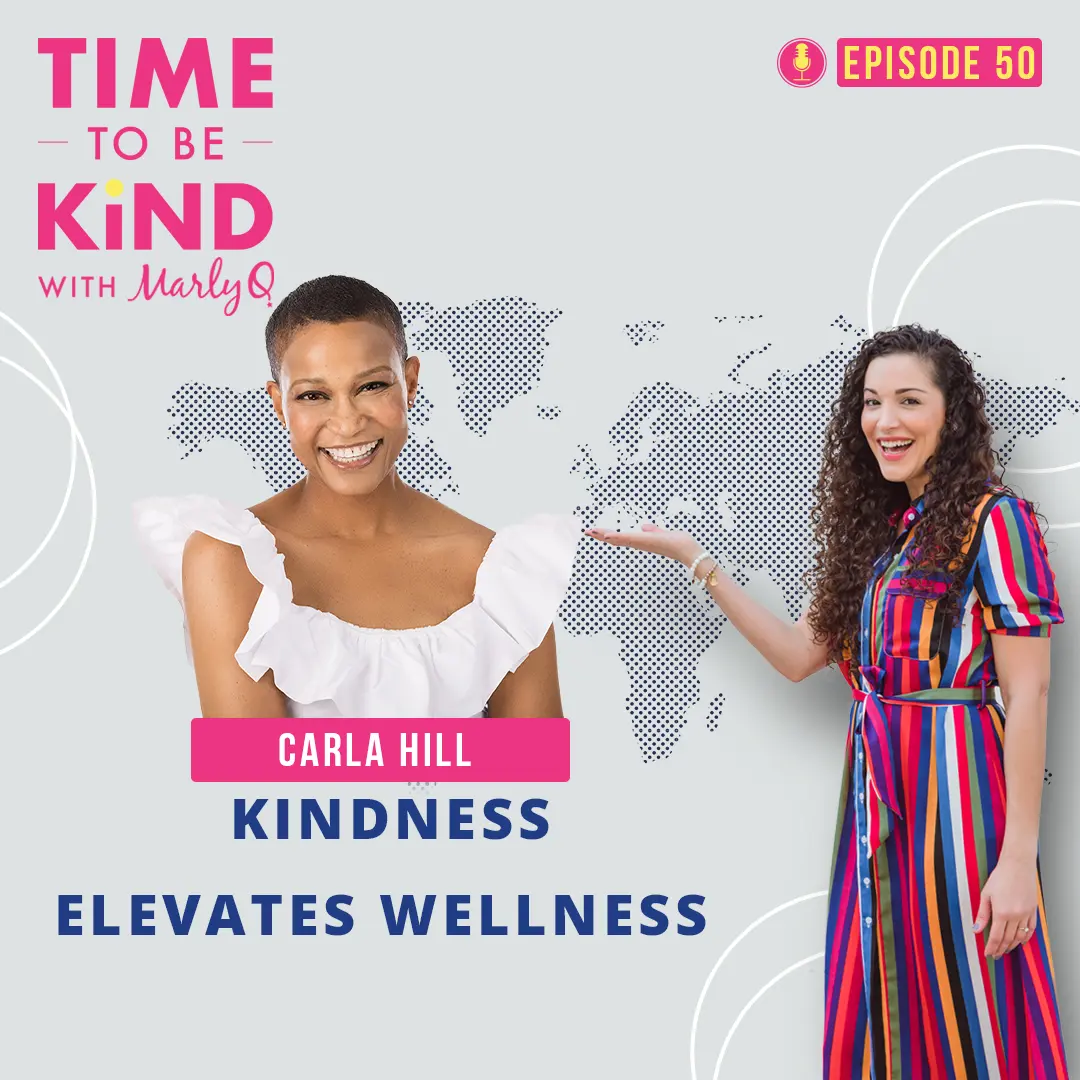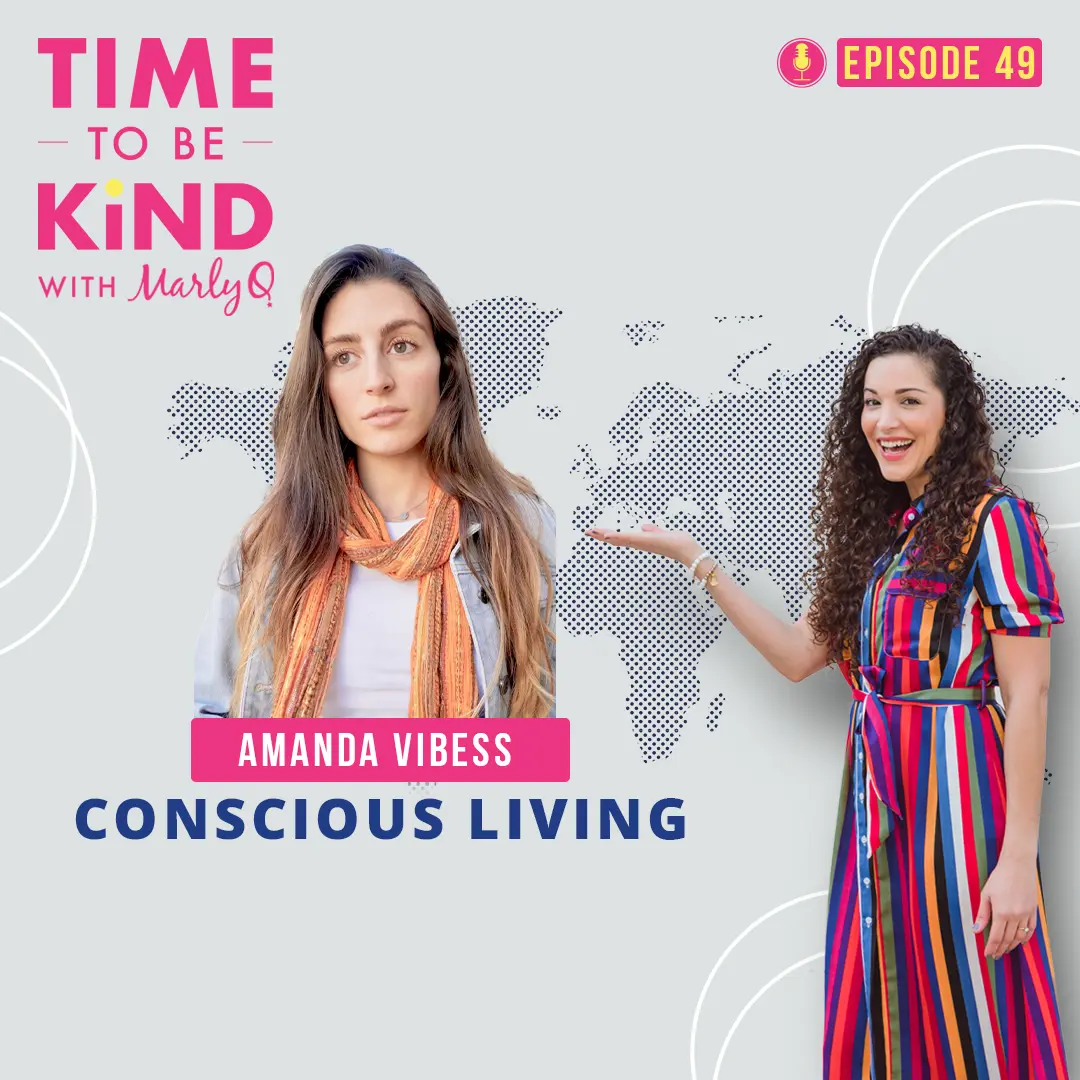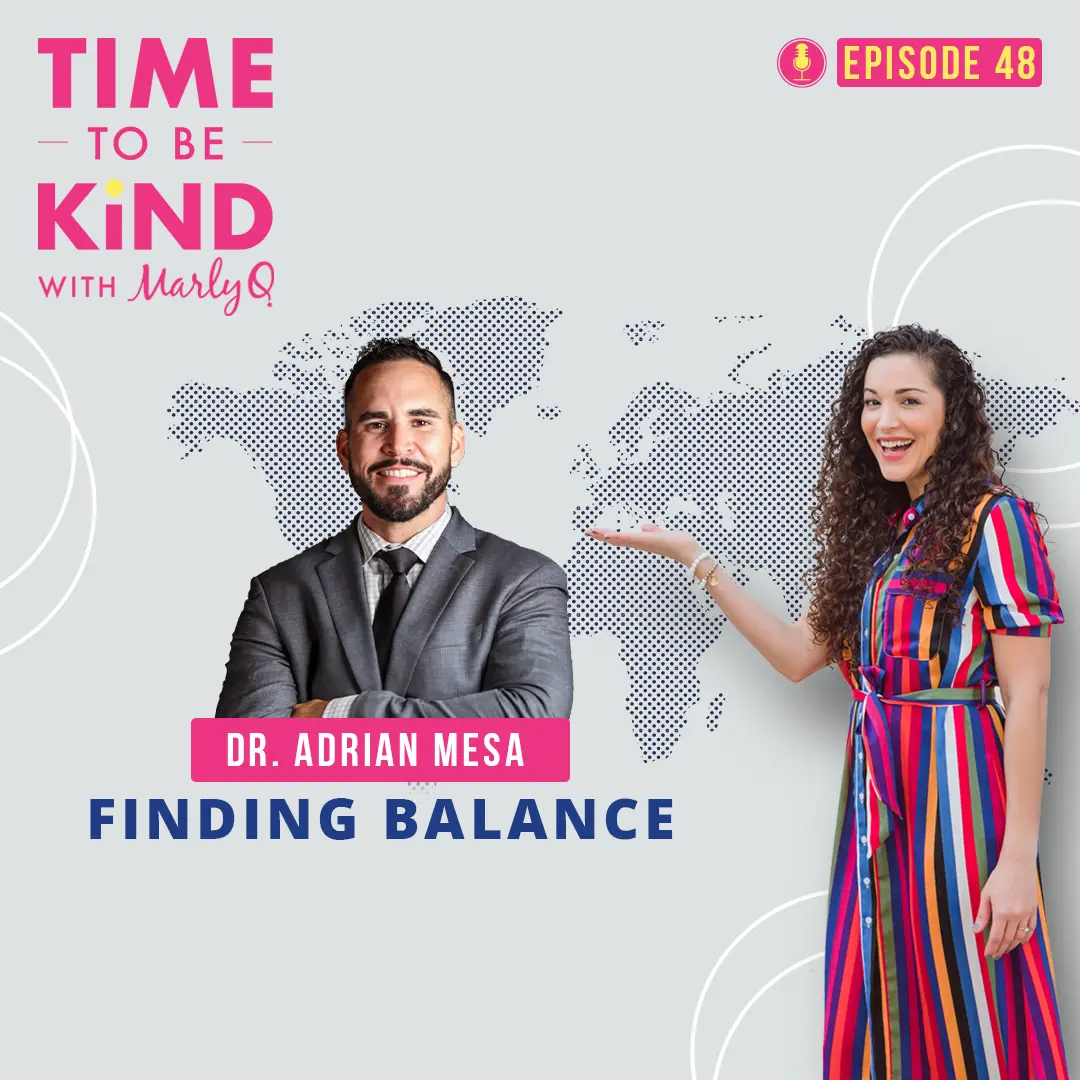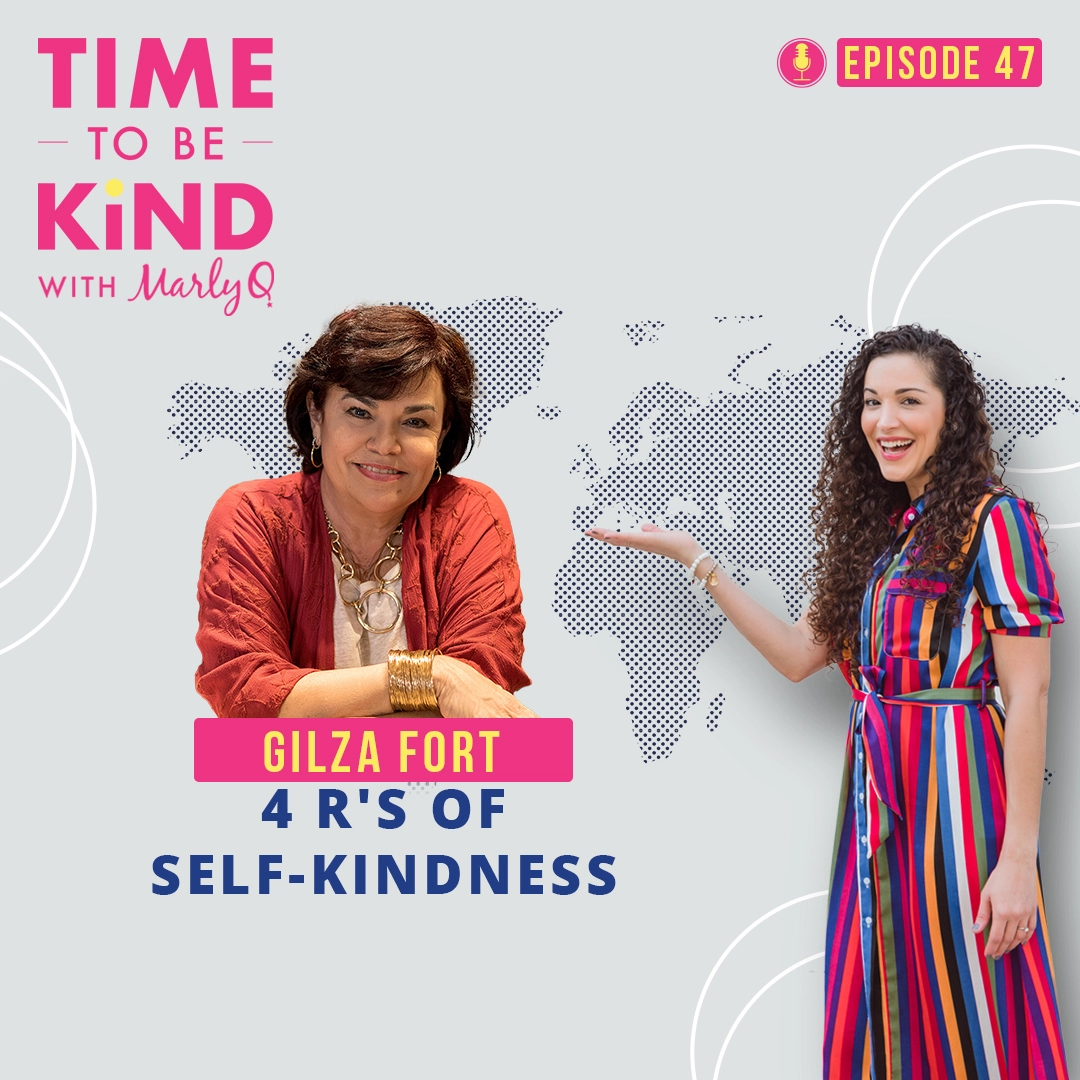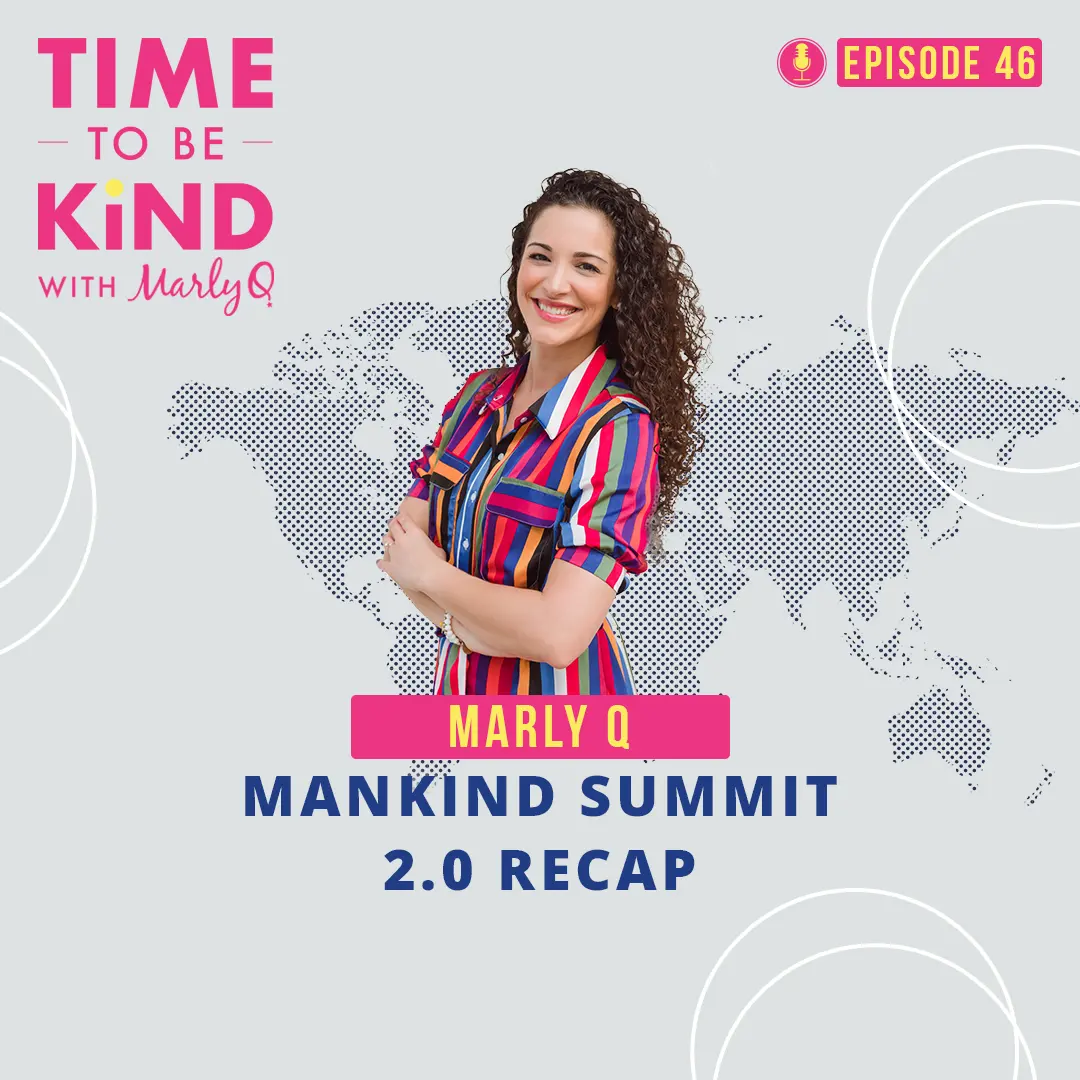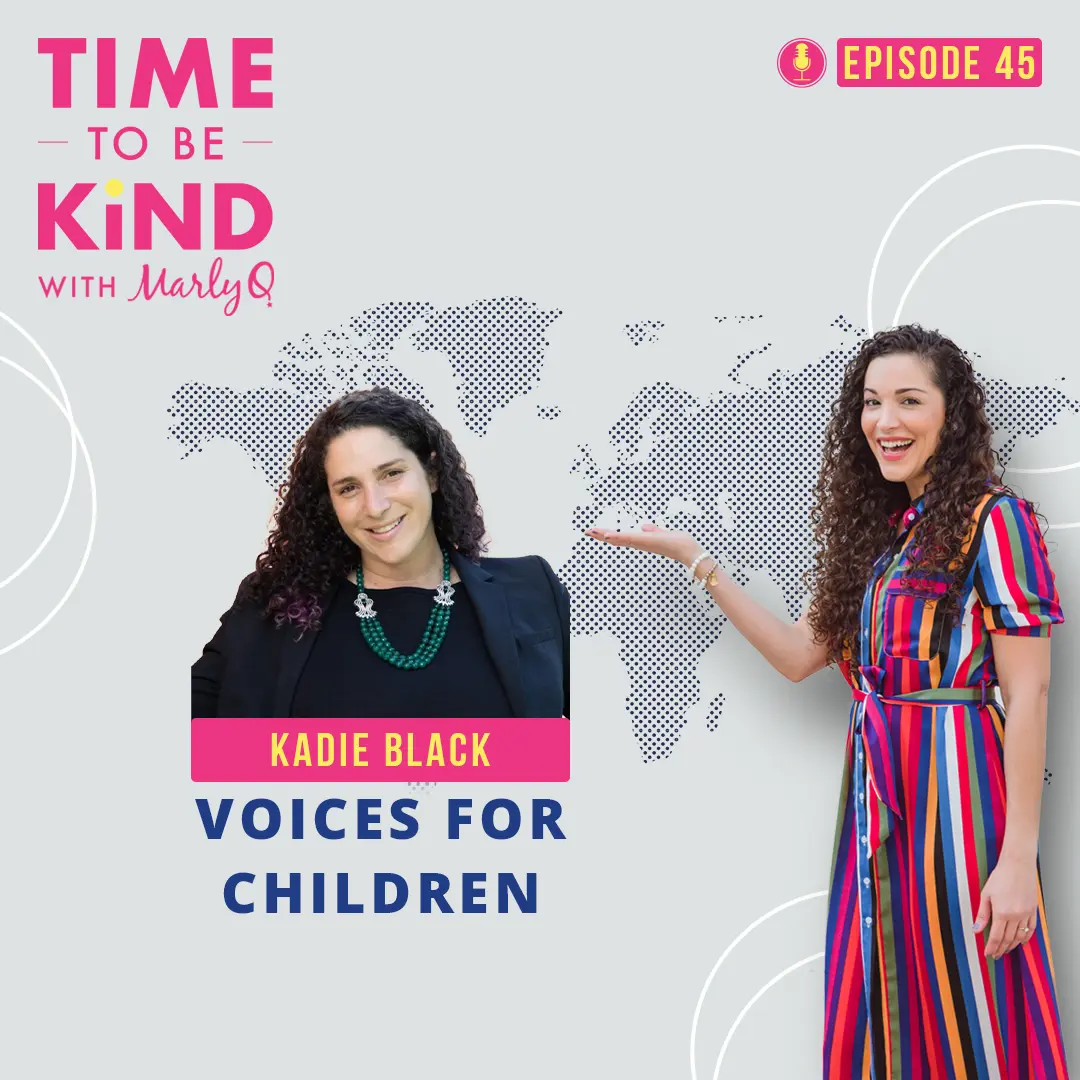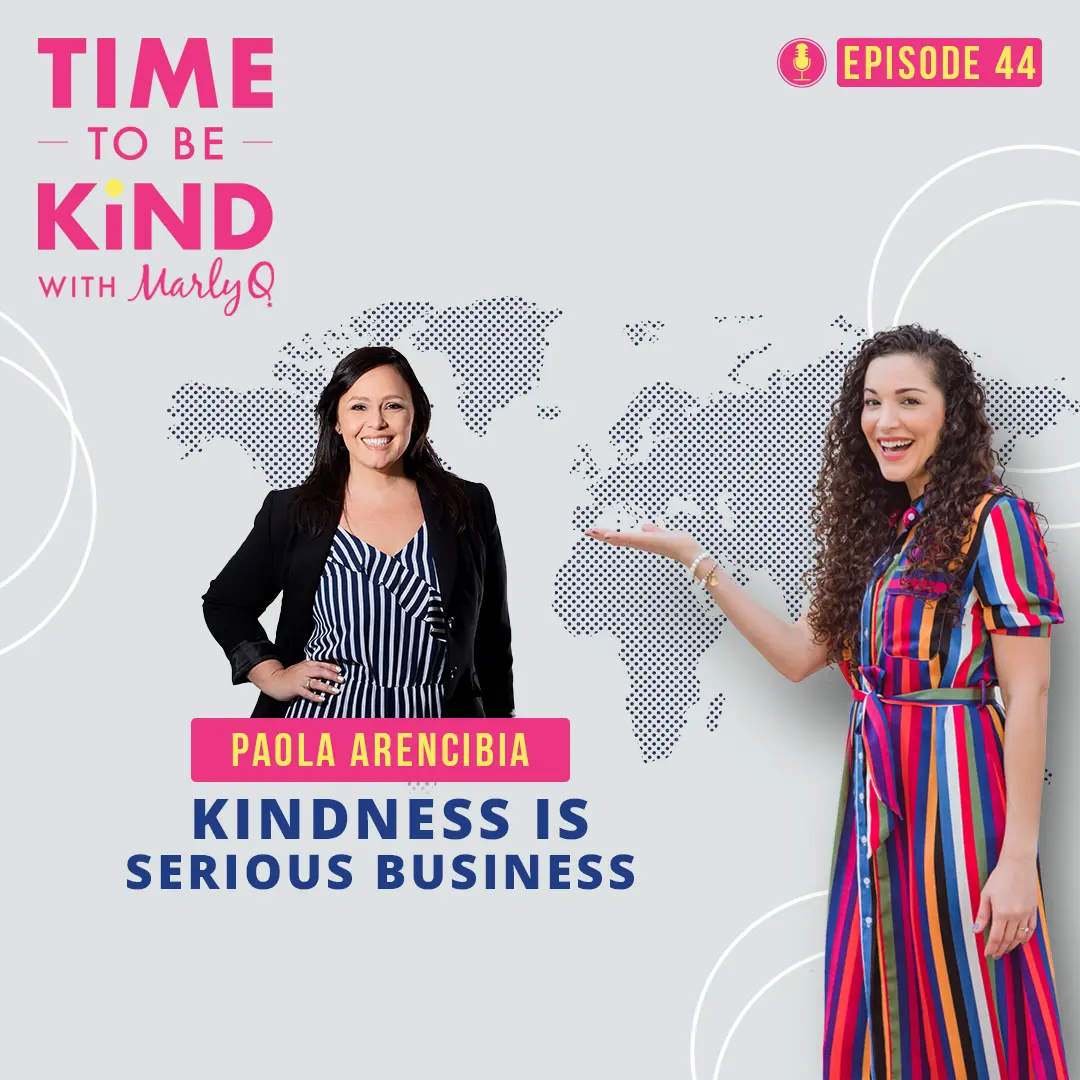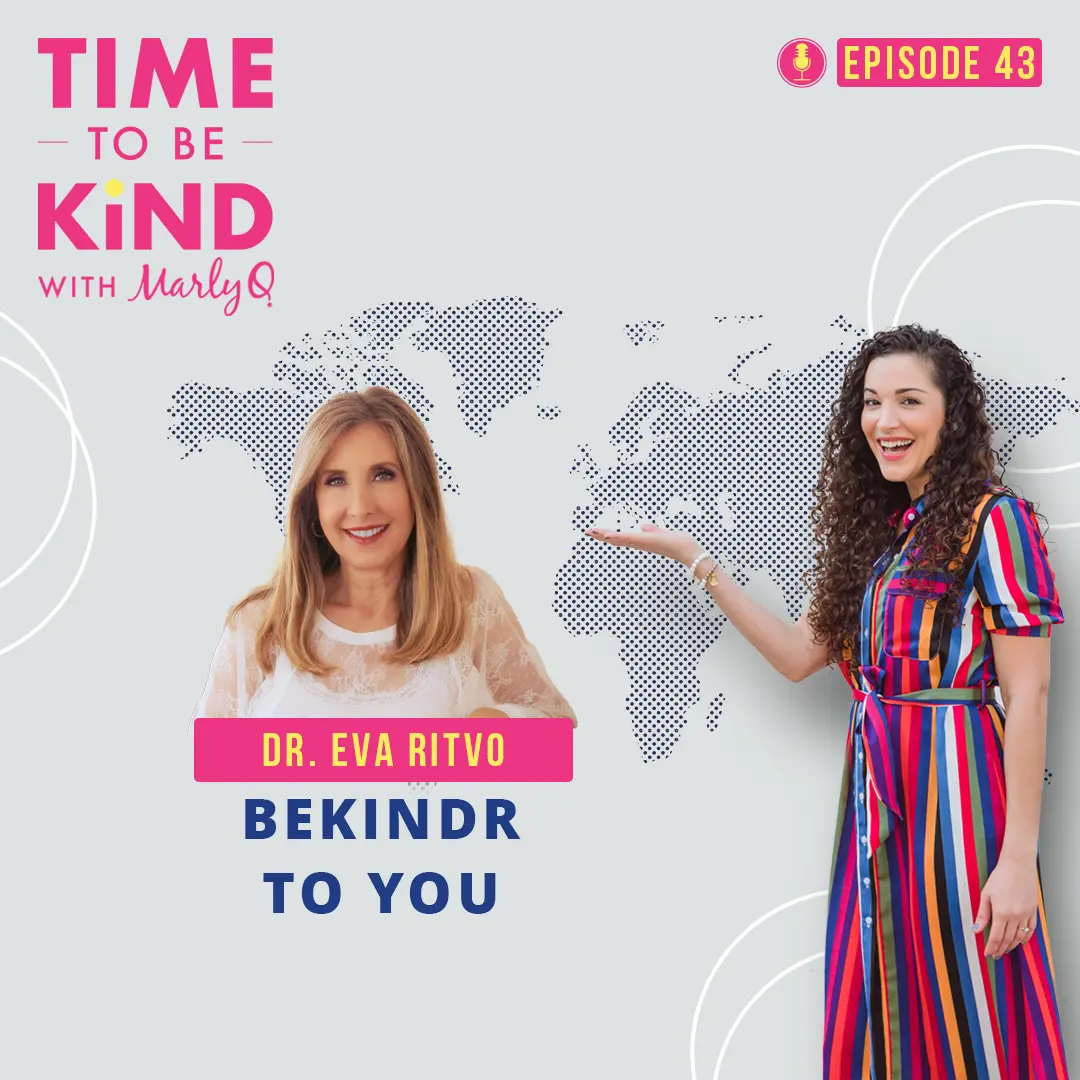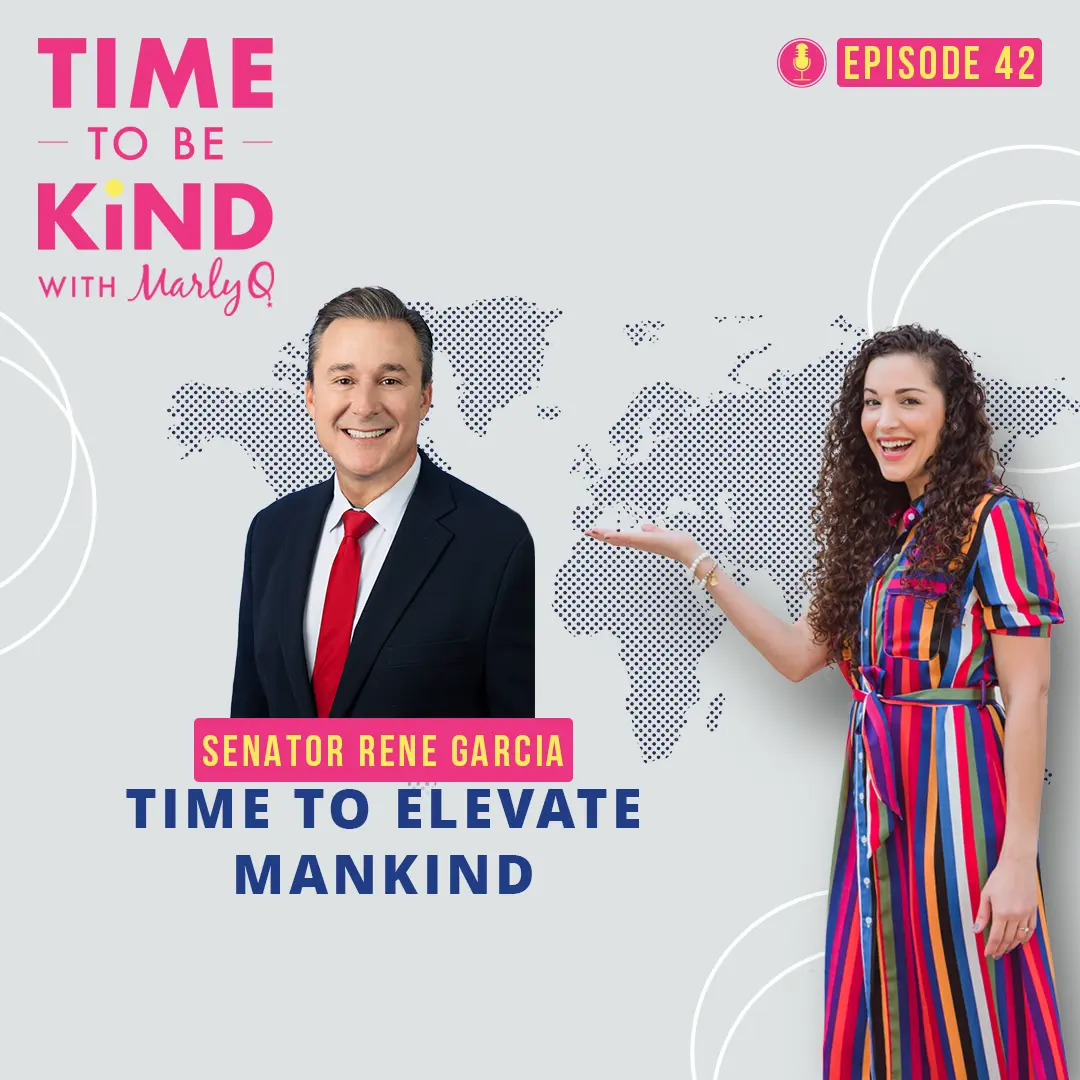Intro to Human Design with Cynthia Mendez Tamayo
Thanks for making Time to be Kind for another insightful episode with Podcast Host and Kindness Influencer, Marly Q joined by Cynthia Mendez Tamayo, a licensed marriage and family therapist with expertise in EMDR and Human Design. You’ll learn what “Soul Aligned Wellness” means and how Human Design can be used as a practical self-discovery tool to optimize your wellness, effectiveness and overall life experiences. Listen now to uncover the nuances of human energy types and how they can impact personal and professional relationships plus our systems at large!
Join our Kind QREW community – Click here
Join our Kind QREW+ Paid Membership – Click here
“Alone we can do so little; together we can do so much.” ~ Helen Kelle
Listen to this Episode and Learn…
-
- Wellness isn’t a one-size-fits-all concept. True wellness is soul aligned, understanding and embracing your individual needs for optimal physical and emotional health.
- Wellness extends beyond the individual and impacts the larger system they are a part of. By improving individual wellness, we can influence the wellness of the entire system, be it family, work, or community.
- The Power of Self Discovery. Knowing oneself is the first step in impacting the systems we live in. The journey to self-discovery and soul alignment can create a ripple effect, improving individual and collective wellness.
- An introduction to Human Design and and how by understanding our unique design, we can live more authentically and effectively.
- Awareness of our human design can significantly enhance our functioning in teams, both at work and at home. This understanding promotes a more efficient use of energy, leading to more harmonious relationships and productive teams.
About Marly Q:
Kindness Influencer, Leadership Trainer, and Community-Builder on a mission to create a kinder world for over two decades. Through her podcast, she invites listeners to make “Time to Be Kind” each week to receive a spark of kindness, connection and community.
Connect with Marly Q:
LinkedIn: https://linkedin.com/in/MarlyQ
Instagram: https://instagram.com/MarlyQ
Facebook: https://facebook.com/theMarlyQ
YouTube: https://youtube.com/@MarlyQ
Twitter: https://twitter.com/MarlyQ
TikTok: https://tiktok.com/@theMarlyQ
About Our Guest:
Cynthia Mendez Tamayo is a licensed marriage and family therapist with a specialization in EMDR and Human Design. Her expertise lies in “Soul Aligned Wellness” and the practical application of Human Design as a self-discovery tool. Cynthia’s profound insights into human energy types shed light on optimizing wellness, effectiveness, and life experiences. Her contributions in understanding the nuances of human energy and its impact on personal and professional relationships, as well as larger systems, make her a valuable resource in the field of mental and emotional well-being.
Connect with Cynthia Mendez Tamayo
Website: soulalignedwellness.org
Instagram: @cynthia.soulalignedwellness
Email: Cynthia@soulalignedwellness.org
Join our Kind QREW Free Private Facebook Group: https://facebook.com/groups/kindqrew
Join our Kind QREW+ Paid Membership: https://marlyq.com/kind-qrew
Programs & Courses: https://marlyq.com/programs
Marly Q Speaking, Training & Retreats: https://sparkcsr.com
Listen to Marly Q TEDx Talk “Kindness is your Superpower”: https://bit.ly/MarlyQTEDxTalk
EP 03: What makes manKIND? with Dr. Eva Ritvo
EP 13: Living in Gratitude with Vismaya Rubin
EP 34: Don’t Quit on You with Marly Q
TRANSCRIPTION:
Marly Q 00:00:00
Are we designed to be kind? You may or may not believe that. So in today’s episode, we’re going to explore that question and learn about a logical system that helps us to better understand our own nature and human design. Stay tuned.
Marly Q 00:00:27
Welcome, friends. Thank you so much for making Time to Be Kind with Marly Q and our special guest PARKer, today. She is the founder of Soul Aligned Wellness. She’s a licensed marriage and family therapist with specialized training in maternal mental health, EMDR therapy, and quantum human design, which I cannot wait for us to dive into and learn more about. Welcome to the show. Cynthia Mendez Tamayo.
Cynthia Mendez Tamayo 00:00:50
Hi.
Marly Q 00:00:52
Welcome. Thank you so much for making Time to Be Kind.
Cynthia Mendez Tamayo 00:00:55
Of course. I’m so excited to speak on this topic.
Marly Q 00:00:58
Yes. So first, I’m going to put you on the spot. What’s a PARKer? Do you know what a PARKer is? Because I just referred to as a PARKer, and those listening are PARKers, too. Do you know what a PARKer is?
Cynthia Mendez Tamayo 00:01:07
Someone who performs random acts of kindness.
Marly Q 00:01:11
Yes.
Cynthia Mendez Tamayo 00:01:11
Did I get that right?
Marly Q 00:01:12
The word we have to flip one word, but yes. You got it. You got it. I put all of my guests on the spot here just to test the lingo. Is it landing? So a PARKer is a person that performs acts of random kindness, right? People like you and me and us listening, who are out in the world, being that spark of change that we wish to see in the world. The purpose of this podcast is to inspire and influence and unite more PARKers so that we really can shift our world and our culture into one that’s more kind and of service to one another. So thank you for being that spark and making that time today.
Cynthia Mendez Tamayo 00:01:45
Absolutely.
Marly Q 00:01:46
Yeah. So I want to just kind of jump right into it, I would love your take on wellness, and specifically Soul Aligned Wellness. What does that mean?
Cynthia Mendez Tamayo 00:02:07
So the idea behind Soul Aligned Wellness is that wellness is not a one size fits all type of experience. Right. And I think that when we talk about self care and when we talk about we as a collective, right, there seems to be a lot of ideas on how to do it right or wrong. But this idea of it being soul aligned is that we each have a very particular way of taking care of ourselves and of others, right. The people that are around us. And if we do this in a way that is so aligned, then we are able to. The term that I like to use is get more bang for our buck, right? Like, if we’re doing all the things, we’re not really able to optimize, the things that help us restore. And in that restorative process, we’re able to show up as the best version of ourselves. And I think that being able to explore this and do it in a way that is very individualized and supportive, right. Because if the individual is functioning optimally, then it supports the system. And that’s really where I come from, looking at things from a systemic point of view as a marriage and family therapist, right.
Marly Q 00:03:11
So we talk about a systemic point of view. Let’s talk about what that means, right. Like, it’s not just you being aligned with your own soul’s purpose and your own wellness, right. But that also affects the system with which you live in, right? Your family system, your work system, your community. Right. So talk to us a little bit more about that.
Cynthia Mendez Tamayo 00:03:29
Right. So when I started to go through my clinical process, when I started school, there were different philosophies, right? There was the mental health track, major family tracks, social work track. And the reason why I landed on the one that I did was because of this idea of the systemic point of view, right. Looking at the family systems and all these systems that we exist in, because there’s many and you mentioned a few of them. So this idea of the individual doesn’t exist in a bubble, right. We’re impacted by those around us, and we impact those around us whenever. For example, I have a couple a person come to therapy, and they’re telling me that they’re having marital issues and they’re like, oh, but I can’t drag my partner to come. They’re against therapy or whatever reasons they bring. What I explain to them is that just by coming as an individual, we are able to impact the system. Right. Because if we change the way that we show up, then we create a ripple effect in those around us. Right. If I show up differently, you have to respond to me differently. So that creates we always think that as one person, we can’t create that change. Right. You hear people say this all the time, oh, but it’s just me, but nobody in my family wants to do it. I’m the only one that’s interested. And usually the person that’s interested in impacting the system is the person that ends up carrying the pathology, right. Because they end up carrying the burden of the system. So I just tell them, if you can show up authentically, then your needs can be met and you can help meet the needs of the people around you. The first place to start is understanding yourself. You’d be surprised how many people come to therapy and they really have no idea who they are, what they want, what lights them up, what they desire to do who they desire to be. So that seems to be the starting place and that’s how we impact the systems.
Marly Q 00:05:08
Self discovery, soul alignment, really taking stock of who we are as individuals, but also as the collective right? And how one person does impact the system and the world, the collective right? I definitely believe in personal responsibility. I believe in personal development. I have been an avid student in personal development for well over 20 years. And one of the systems that I’ve landed upon fairly recently and has really made an impact has been this quantum human design. Can you tell us what is human design?
Cynthia Mendez Tamayo 00:05:40
So, human design is relatively new and what it is is a synthesis of Eastern and Western philosophy. So it combines astrology, the Chinese Iqing, the Hindu Chakra system, the Kabbalah system, and quantum physics. And through combining and synthesizing all these different philosophies, it came up with what they call an Energy Blueprint, which shows you how you optimally function from an energetic standpoint.
Cynthia Mendez Tamayo 00:06:06
Right?
Cynthia Mendez Tamayo 00:06:06
Like how are you able to use your energy in a way that is effortless?
Cynthia Mendez Tamayo 00:06:12
Really?
Cynthia Mendez Tamayo 00:06:12
Because if you’re living in alignment, it shouldn’t feel hard, right? Because you’re showing up in a way that feels in the flow for you instead of resisting. And when we’re all able to do that, then together there’s a lot of individuality in this too, I think a lot of our systems are focused to create kind of like cookie cutter experiences of all of us. And it works for some people if the system was created for that specific energy type. But there are a lot of outliers that then end up struggling and feeling different or feeling like they don’t belong. So by having this Energy Blueprint, I’m able to guide my clients on how to use their energy in a way that makes sense and how to understand the people around them in a way that makes sense so that they can work with them and not against them. Yeah.
Marly Q 00:06:58
So human design isn’t like a philosophy or like some theory or like some cult, right? It really is kind of like a logical system that brings together all these different principles and modalities for people who might be listening, who’ve never heard of human design. What might be the best way to kind of get started understanding, right. Like the different types in human design, for example, overview level.
Cynthia Mendez Tamayo 00:07:24
So the human design or chart can give very complex and very detailed. But the biggest takeaway for people and where I would start when I start working with my clients, where I start is just understanding their energy type. There are five energy types generator, manifesting, generator reflector, Projector and manifester. And each energy type shows up differently, right? They function differently, they each have a different role to play within society. And just by understanding how those energies show up and what they need to be able to show up consistently is half the battle. So I can give examples of this in my own family system. I am a generator. Generators are the builders, right? We have all the energy, we do all the things. We are the workers. As long as we are doing the thing that lights us up, we can literally wake up and hit the ground running and literally fall out at the end of the day.
Cynthia Mendez Tamayo 00:08:20
Right.
Cynthia Mendez Tamayo 00:08:20
And that’s how we’re designed to function. And we want to work. It is our purpose. My husband is a projector. Projectors are the keepers of wisdom. They are not designed to work the typical nine to five job and they will burn out very quickly. Something that I do want to be clear within human design is that it’s not about we can or cannot do anything. We can all do all of the things.
Cynthia Mendez Tamayo 00:08:43
Right.
Cynthia Mendez Tamayo 00:08:44
The take home point is that if we do something that is not aligned with us, with who we are, with our energy type, we are probably going to be very unhappy.
Cynthia Mendez Tamayo 00:08:53
Right.
Cynthia Mendez Tamayo 00:08:53
So it’s not that my husband cannot work a nine to five. He does work a nine to five, but it is not the most conducive type of environment for him to really live out in his authentic highest self.
Cynthia Mendez Tamayo 00:09:06
Right.
Cynthia Mendez Tamayo 00:09:06
So that to me was so mind blowing to understand because it allowed me to understand not only the experience he’s having working a nine to five, but also the experience that we have once he comes home from that nine to five.
Cynthia Mendez Tamayo 00:09:20
Right.
Cynthia Mendez Tamayo 00:09:20
And just how he can participate differently in the responsibilities we have as parents and running a household. And before understanding this, it could lead to a lot of resentment or blaming or just not understanding why is the person showing up differently. And we can attach meanings, and I talk about that a lot, right. How we attach stories to the things that happen. If my husband gets home and he’s depleted because literally the energy he has has been depleted at his nine to five and he comes home and is not able to do a whole lot at home, I could very easily say he doesn’t love us, he’s lazy, he doesn’t care.
Cynthia Mendez Tamayo 00:09:55
Right.
Cynthia Mendez Tamayo 00:09:55
And see how this but just those little statements, those little stories that I, those seeds that I’ve planted in my mind can create a host of issues in the marital relationship and in the parenting relationship.
Marly Q 00:10:06
And human design helps you to just basically better understand your design, right. And your best way of being efficient with your energy.
Cynthia Mendez Tamayo 00:10:16
Right.
Marly Q 00:10:16
So I’d like to share the way that I came across human design was kind of unconventional. I was in a clubhouse room in December of 2021. I believe I was in a little bit of a rut.
Cynthia Mendez Tamayo 00:10:29
Right.
Marly Q 00:10:29
I had kind of lost my business, my event planning business, due to the pandemic. And I’m really kind of hitting this pause. Brand new mom with two kids now and figuring out how I’m going to rebuild. And I was in a clubhouse room and just sharing how I just felt so burnt out and I didn’t really have clarity on my next step. Even though I know what my soul alignment is or I feel I know what my calling is, is kindness, right. But how can I really turn this into a business now where I just focus all of my energy on that? And I was sharing this and the person that was leading the clubhouse room was like, I think you’re a projector. Have you ever heard about human design and this and that? And I had no idea what she was talking about. And you have very limited amount of time in clubhouse to speak and interact. So I just wrote it down. I’m like, human design projector. What’s she talking about? I’m thinking about a projector from like back in the days that you put overhead projectors in schools. I’m really dating myself here and yes, that’s what I thought. I’m like, what is she talking about? Anyways, then I look into it and being kind of like the avid student that I am, I went down this rabbit hole. I did my chart and I’m looking at this super complex system that just really spoke to me and helped me to understand so much of my experience in life. Right. Was not aligned. And even though I have always been a high achiever, I feel like I’ve always been on my purpose to spread kindness and do my volunteer, my philanthropic work. And everything that I’ve been doing, I’ve always felt like I was doing the aligned work, but not in the aligned way. That was actually sustainable for me to carry out this mission sustainably for the Rest of my life. Right. So learning that I’m a projector that has her own energy but that I don’t have this consistent flow of energy and how important rest is to me and my ability to actually show up for others was really life changing. I’m like what this was like news to someone who has really worked her butt off her entire life. Was raised in a very immigrant household who believes in hard work and there’s no rest. Right. You work on sunday, you work all the time. And I was just raised by generators, I guess. And I only realized this. I’m about to turn 40 people well into my 30s.
Cynthia Mendez Tamayo 00:12:39
But projectors typically burn out between 35 and 40. If they’re not living doing things in an aligned way.
Marly Q 00:12:46
Well, then I was very much on track and I did burn out completely there. And I find it to be such a gift and I’m so grateful to that person that I don’t even know who she is, who just mentioned to me you might be a projector. Have you looked into this? So that was really the spark and the reason why I asked you to be on the show, right, and to share this. Because if we could all just learn a little bit more about ourselves, right, the self discovery, so that we can actually show up in this world, like, authentically as who we are and being in alignment with our energy and our strategy for making decisions and all of that. My goodness. Not just for you, but like you said, for your family and at work. So how can knowing your human design and that of your team at work help us function better?
Cynthia Mendez Tamayo 00:13:48
So the beautiful thing in creating teams using human design is that you can create a team in a way that highlights the skills, like the strengths of each person, right? So if I have, let’s say you and I were working together. You’re a projector, I’m a generator. You were the keeper of wisdom, right? You were probably going to see the areas that need adjustment, that need to be fixed. For example, your mission in wanting to spread kindness, right. Seeing that there’s a need for kindness in the world. Myself, as a generator, I would come in and be like, oh, Marly, that’s great. So you want to do this now, how do we create I can create the work in it, right? Like, put the pieces together to build the system or the way of doing it. Now we can get into very specific parts of the chart where it’ll explain what are the things that you so when we look at specific gates, like what are the things that you bring to the table that are very easy for you to do? So, for example, in my chart, I have the channel 37 40, which is about community, but also about contracts, which is a lot of the work that I do in relationships, right? Relationships, in a sense, it are contracts. They’re contracts that we make with other individuals, whether they’re spoken or unspoken.
Cynthia Mendez Tamayo 00:15:05
Right.
Cynthia Mendez Tamayo 00:15:05
So one of the things that I’m really good at is seeing how you can create a contract with another person, how you can enter a relationship with another person in a way that is fair and sustainable for all the people involved, right. That it’s a win win situation. So knowing that that is my strength and that I can come to a team and say this is what I offer.
Cynthia Mendez Tamayo 00:15:27
Right?
Cynthia Mendez Tamayo 00:15:27
This is one example. There are many others within our chart because we have many skills as individuals. And then you can come in and bring your skills to the table and we’re all going to be happy and a well oiled machine because everybody’s doing the thing that feels good for them instead of feeling like they’re doing that one thing that I really don’t want to do because it doesn’t light me up. I mean, sometimes we have to do the thing we don’t want to do, right? I want to be clear about that. But when we’re doing it as a means to an end, it’s different than when this has just become our reality.
Cynthia Mendez Tamayo 00:15:58
Right?
Cynthia Mendez Tamayo 00:15:58
Instead of bringing in the person who.
Marly Q 00:16:00
Is going to be lit up by.
Cynthia Mendez Tamayo 00:16:01
That so that you can do the part that you’re lit up by because that’s where you’re going to shine. And when everybody shines, then we create that systemic impact.
Marly Q 00:16:09
Absolutely. It’s been life like transformational to even and I don’t know everything about my chart. I know very kind of like tier one, level one understanding of my human design body graph and even that at an elementary level has really, really made a big difference. And understanding my children’s chart and my husband who’s a generator and I’m a projector, really understanding our dynamic, it just helped so much to just understand because at the end of the day, don’t you just want to feel like understood?
Cynthia Mendez Tamayo 00:16:36
Right?
Marly Q 00:16:37
Now I take rest as like it’s like my divine right is to rest it. This is like unheard of, right? Like pre Marly Q, a couple, I don’t know, five, six years ago rest it’s like no way. And I know that I could like you said, it’s not that I can’t perform like a generator. Sure I can. I have built and achieved and goals and been on this hamster wheel of doing doing my entire life until I totally burnt out and realized this is not sustainable. This is not even like what I want to be doing. It shouldn’t feel so hard to show up in life as myself.
Cynthia Mendez Tamayo 00:17:12
Right?
Marly Q 00:17:12
And it just really, really gave me this better understanding of myself and others. I see how it helps within my family system, even bringing it to my work as a leadership trainer when I’m doing team building workshops and retreats. I’m not teaching human design, I’m not qualified to do that at all. But I definitely see the value in bringing this kind of information and understanding to our workplaces. It’s not a personality test, it’s not a skills like finder. It is literally a chart of your body graph and it’s based on your birth date and time and the place for any critics out there, like my husband included, that people that might be like, oh well, who comes up with this manifesto and generator and projector and reflectors? Who comes up with all of this information? What would you say to my critics out there?
Cynthia Mendez Tamayo 00:17:57
I can get into an explanation as to how it came up and how they did it. And it gets very scientific when you look at even the concept of understanding astrology before, I never fully understood like, okay, so they get your birth time, your birth information, how do they come up with this information? And there is an explanation behind it. But I think rather than getting into the explanation of how they came up with it, what I would say to somebody that asked me that question, your husband included, is experience human design. I have not met somebody yet that has not experienced it. And he’s been open to having their chart looked at that has not had this information provided to them and has had the reaction of, god, I feel seen probably for the first time ever, right? And I think in that experience of feeling seen, the rest of the stuff doesn’t really matter, right? It doesn’t really matter how they came up with it. It just matters that it is almost like you’re wearing like a blindfold and all of a sudden this blindfold falls off and you’re like, there I am. Like, for the first time I see my reflection in the mirror and I haven’t have an understanding of who I am because that was when I had my first human design reading. So I’ve always been very aligned. So there was one thing about my reading that felt good, that I was like, yes, I’m aligned, right? I’m very aligned with my strategy and my type. But more than anything, it was this idea of it all resonates. And when I saw that it all resonated, I was like, pull my kids charts, pull my husband’s chart, pull everybody’s chart. And in seeing their charts, there was also a deep understanding of who they are because I was already seeing it. I didn’t need anybody to prove it to me. I didn’t need anybody to explain to me how this was real because it was automatically a tool that I knew that I could use to shift the dynamic of my family. And around the time, maybe a little bit before I discovered this, we were going through a hard time as a family. I mean, there were conversations of possibly separating. We were struggling in our relationship and parenting. There was so much going on. And once I was able to receive this information, it completely changed the way that I viewed the family dynamic, my family dynamic. If somebody wants to sit down and get into the history, I can provide them with resources on how it got here and why it is backed by science.
Cynthia Mendez Tamayo 00:20:15
Right?
Cynthia Mendez Tamayo 00:20:15
But I think even if I did that, it would feel so complex that the question wouldn’t really be answered for the person. So what I would say is that they really need to just experience it and then decide for themselves.
Marly Q 00:20:25
I love that. I love that because first I keep every episode under 30 minutes, so there’s definitely no time to get into all of that. So I appreciate kind of like, the step one, because one of the things that I love about human design is that it’s practical. I’m a very practical person. And what I realized and what I loved about human design is that it was very practical, straightforward advice. And it is about experimenting with your design, right? So just what you said just to emphasize it maybe in a different way, rather than experience it for yourself, it’s really an experiment. Experiment with your design and the strategies that it tells, that it identifies for you. For me, it’s been completely life changing to understand that my strategy for protecting my energy so that I stop burning out, which was a continual thing in my life. Migraines burnout events, big events, big goal. Achieve migraine burn up.
Cynthia Mendez Tamayo 00:21:31
Okay.
Marly Q 00:21:31
Build myself back up again over and over and over again. I’ve been an entrepreneur for almost 15 years, and, man, learning that the way that I can actually protect my energy is to wait for the invitation to not always think that I need to be the spark and the initiator of all the things, and I’m the one that needs to build the events or build the thing. Like, wow, maybe I’m not the builder and I am, like, the guide of the energy and what is being built. It was like what? And the more I rest and take care of myself, the better I can show up and the more I can give and the more I can inspire and influence what I don’t have to be. It was really amazing and liberating, and in a way, I just wanted you to share with us a little bit. If it can serve us the spark to have somebody go down, like, the path of discovering their body, graph their human design, seeing how that relates or resonates with you, start the experiment. If it doesn’t resonate with you, then it doesn’t. But I think even for the biggest critics. With love, you can’t dismiss the power in self discovery and the power that exists in just knowing who you are and being able to show up in life, at work, in the world as that being right.
Cynthia Mendez Tamayo 00:22:57
It creates a platform or a foundation for love and acceptance.
Cynthia Mendez Tamayo 00:23:02
Right?
Cynthia Mendez Tamayo 00:23:02
And when we come from a place of love and acceptance and couple that with the kindness, I mean, there’s so much power in that. And it’s only in our individuality and our authenticity that we can really explore that. Absolutely.
Marly Q 00:23:15
Cynthia, thank you so much for taking time out of your day and your work day to spend it with us. I appreciate you making Time to Be Kind, and I will make sure to share all of your links to your website and to your social medias. And I know that you are kind enough offer our Kind QREW and our PARKers Listening $100 off. If you’re interested in a human design reading, all you need to do is make sure that you leave a Kind comment. If you’re going to rate and review, leave a comment mentioning this podcast episode. Send that screenshot as proof to Cynthia and she will go ahead and grant you that $100 off. That’s super generous of you.
Cynthia Mendez Tamayo 00:23:49
Thank you. Thank you so much for having me. I’m super excited about continuing to spread the message about this and really helping people step into their authenticity. There you have it, friends.
Marly Q 00:23:57
So do I believe that we’re designed to be kind? Yes. Yes. I believe that kindness is at the core of what makes us human and that we must uphold this standard in order to unite as one mankind. My mission with this podcast and all the work that I do as an inspirational speaker, as a leadership trainer and a community builder, all of it at the core is to simply remind you, remind people, that this is who we are.
Cynthia Mendez Tamayo 00:24:23
We’re PARKers.
Outro
We’re people that perform acts of random kindness. And if you’re still here, you’re listening, then I know that’s you. So go ahead and join my Kind QREW, if you haven’t already, so that we can create this kinder world together. Visit Marlyq.com this episode number for the link to request access to join our Kind QREW Facebook group. Make sure you say hello when you’re in there. And remember, if you leave a comment mentioning this episode, cynthia is going to give you $100 off a human design reading. It is absolutely transformational experience for the links to connect with Cynthia directly, plus this episode full transcription and show notes, visit Marlyq.com forward slash this episode number. Thanks for making Time to Be Kind. See you next time.
Join our Kind QREW – Free Private Facebook Group: Click here to Join Now

